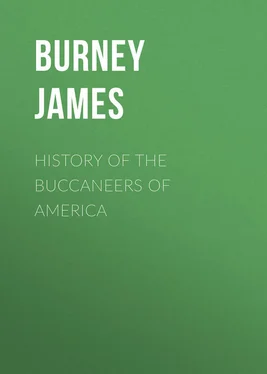James Burney - History of the Buccaneers of America
Здесь есть возможность читать онлайн «James Burney - History of the Buccaneers of America» — ознакомительный отрывок электронной книги совершенно бесплатно, а после прочтения отрывка купить полную версию. В некоторых случаях можно слушать аудио, скачать через торрент в формате fb2 и присутствует краткое содержание. Жанр: foreign_antique, foreign_prose, на английском языке. Описание произведения, (предисловие) а так же отзывы посетителей доступны на портале библиотеки ЛибКат.
- Название:History of the Buccaneers of America
- Автор:
- Жанр:
- Год:неизвестен
- ISBN:нет данных
- Рейтинг книги:4 / 5. Голосов: 1
-
Избранное:Добавить в избранное
- Отзывы:
-
Ваша оценка:
- 80
- 1
- 2
- 3
- 4
- 5
History of the Buccaneers of America: краткое содержание, описание и аннотация
Предлагаем к чтению аннотацию, описание, краткое содержание или предисловие (зависит от того, что написал сам автор книги «History of the Buccaneers of America»). Если вы не нашли необходимую информацию о книге — напишите в комментариях, мы постараемся отыскать её.
History of the Buccaneers of America — читать онлайн ознакомительный отрывок
Ниже представлен текст книги, разбитый по страницам. Система сохранения места последней прочитанной страницы, позволяет с удобством читать онлайн бесплатно книгу «History of the Buccaneers of America», без необходимости каждый раз заново искать на чём Вы остановились. Поставьте закладку, и сможете в любой момент перейти на страницу, на которой закончили чтение.
Интервал:
Закладка:
That the English, French, and Hollanders, in their early voyages to the West Indies , went in expectation of meeting hostility from the Spaniards, and with a determination therefore to commit hostility if they could with advantage, appears by an ingenious phrase of the French adventurers, who, if the first opportunity was in their favour, termed their profiting by it ' se dedomager par avance .'
Much of Hispaniola had become desert. There were long ranges of coast, with good ports, that were unfrequented by any inhabitant whatever, and the land in every part abounded with cattle. These were such great conveniencies to the ships of the interlopers, that the Western coast, which was the most distant part from the Spanish capital, became a place of common resort to them when in want of provisions. Another great attraction to them was the encouragement they received from Spanish settlers along the coast; who, from the contracted and monopolizing spirit of their government in the management of their colonies, have at all times been eager to have communication with foreigners, that they might obtain supplies of European goods on terms less exorbitant than those which the royal regulations of Spain imposed. Guarda-Costas. The government at San Domingo employed armed ships to prevent clandestine trade, and to clear the coasts of Hispaniola of interlopers, which ships were called guarda costas ; and it is said their commanders were instructed not to take prisoners. On the other hand, the intruders formed combinations, came in collected numbers, and made descents on different parts of the coast, ravaging the Spanish towns and settlements.
In the customary course, such transactions would have come under the cognizance of the governments in Europe ; but matters here took a different turn. The Spaniards, when they had the upper hand, did not fail to deal out their own pleasure for law; and in like manner, the English, French, and Dutch, when masters, determined their own measure of retaliation. The different European governments were glad to avoid being involved in the settlement of disorders they had no inclination to repress. In answer to representations made by Spain , they said, 'that the people complained against had acted entirely on their own authority, not as the subjects of any prince, and that the King of Spain was at liberty to proceed against them according to his own pleasure.' Queen Elizabeth of England , with more open asperity answered a complaint made by the Spanish ambassador, of Spanish ships being plundered by the English in the West Indies , 'That the Spaniards had drawn these inconveniencies upon themselves, by their severe and unjust dealings in their American commerce; for she did not understand why either her subjects, or those of any other European prince, should be debarred from traffic in the Indies . That as she did not acknowledge the Spaniards to have any title by the donation of the Bishop of Rome , so she knew no right they had to any places other than those they were in actual possession of; for that their having touched only here and there upon a coast, and given names to a few rivers or capes, were such insignificant things as could no ways entitle them to a propriety further than in the parts where they actually settled, and continued to inhabit 4 4 Camden's Elizabeth , A. D. 1680.
.' A warfare was thus established between Europeans in the West Indies , local and confined, which had no dependence upon transactions in Europe . Brethren of the Coast. All Europeans not Spaniards, whether it was war or peace between their nations in Europe , on their meeting in the West Indies , regarded each other as friends and allies, knowing then no other enemy than the Spaniards; and, as a kind of public avowal of this confederation, they called themselves Brethren of the Coast .
The first European intruders upon the Spaniards in the West Indies were accordingly mariners, the greater number of whom, it is supposed, were French, and next to them the English. Their first hunting of cattle in Hayti , was for provisioning their ships. The time they began to form factories or establishments, to hunt cattle for the skins, and to cure the flesh as an article of traffic, is not certain; but it may be concluded that these occupations were began by the crews of wrecked vessels, or by seamen who had disagreed with their commander; and that the ease, plenty, and freedom from all command and subordination, enjoyed in such a life, soon drew others to quit their ships, and join in the same occupations. The ships that touched on the coast supplied the hunters with European commodities, for which they received in return hides, tallow, and cured meat. The appellation of Boucanier or Buccaneer was not invented, or at least not applied to these adventurers, till long after their first footing in Hayti . At the time of Oxnam's expedition across the Isthmus of America to the South Sea , A. D. 1575, it does not appear to have been known.
There is no particular account of the events which took place on the coasts of Hispaniola in the early part of the contest between the Spaniards and the new settlers. It is however certain, that it was a war of the severest retaliation; and in this disorderly state was continued the intercourse of the English, French, and Dutch with the West Indies , carried on by individuals neither authorized nor controlled by their governments, for more than a century.
In 1586, the English Captain, Francis Drake, plundered the city of San Domingo ; and the numbers of the English and French in the West Indies increased so much, that shortly afterwards the Spaniards found themselves necessitated to abandon all the Western and North-western parts of Hispaniola .
CHAPTER IV
The increase of trade of the English and French to the West Indies , and the growing importance of the freebooters or adventurers concerned in it, who, unassisted but by each other, had begun to acquire territory and to form establishments in spite of all opposition from the Spaniards, attracted the attention of the British and French governments, and suggested to them a scheme of confederacy, in which some of the principal adventurers were consulted. The project adopted by them was, to plant a royal colony of each nation, on some one island, and at the same time; by which a constant mutual support would be secured. In as far as regarded the concerns of Europeans with each other, this plan was unimpeachable.
The Island chosen by the projectors, as the best suited to their purpose, was one of the Small Antilles or Caribbee Islands , known by the name of St. Christopher , which is in length about seven leagues, and in breadth two and a half.
1625. The Island Saint Christopher settled by the English and French. Thus the governments of Great Britain and France , like friendly fellow-travellers, and not like rivals who were to contend in a race, began their West-Indian career by joint consent at the same point both in time and place. In the year 1625, and on the same day, a colony of British and a colony of French, in the names and on the behalf of their respective nations, landed on this small island, the division of which had been settled by previous agreement.
The Island St. Christopher was at that time inhabited by Caribbe Indians. The Spaniards had never possessed a settlement on it, but their ships had been accustomed to stop there, to traffic for provisions and refreshments. The French and English who came to take possession, landed without obtaining the consent of the native Caribbe inhabitants; and, because danger was apprehended from their discontent, under pretence that the Caribbs were friends to the Spaniards, these new colonists fell upon them by surprise in the night, killed their principal leaders, and forced the rest to quit the Island and seek another home. De Rochefort, in his Histoire Morale des Isles Antilles (p. 284.) mentions the English and French killing the Caribb Chiefs, in the following terms: ' Ils se defirent en une nuit de tous les plus factieux de cette nation! ' Thus in usurpation and barbarity was founded the first colony established under the authority of the British and French governments in the West Indies ; which colony was the parent of our African slave trade. When accounts of the conquest and of the proceedings at Saint Christopher were transmitted to Europe , they were approved; West-India companies were established, and licences granted to take out colonists. De Rochefort has oddly enough remarked, that the French, English, and Dutch, in their first establishments in the West Indies , did not follow the cruel maxims of the Spaniards. True it is, however, that they only copied in part. In their usurpations their aim went no farther than to dispossess, and they did not seek to make slaves of the people whom they deprived of their land.
Читать дальшеИнтервал:
Закладка:
Похожие книги на «History of the Buccaneers of America»
Представляем Вашему вниманию похожие книги на «History of the Buccaneers of America» списком для выбора. Мы отобрали схожую по названию и смыслу литературу в надежде предоставить читателям больше вариантов отыскать новые, интересные, ещё непрочитанные произведения.
Обсуждение, отзывы о книге «History of the Buccaneers of America» и просто собственные мнения читателей. Оставьте ваши комментарии, напишите, что Вы думаете о произведении, его смысле или главных героях. Укажите что конкретно понравилось, а что нет, и почему Вы так считаете.












